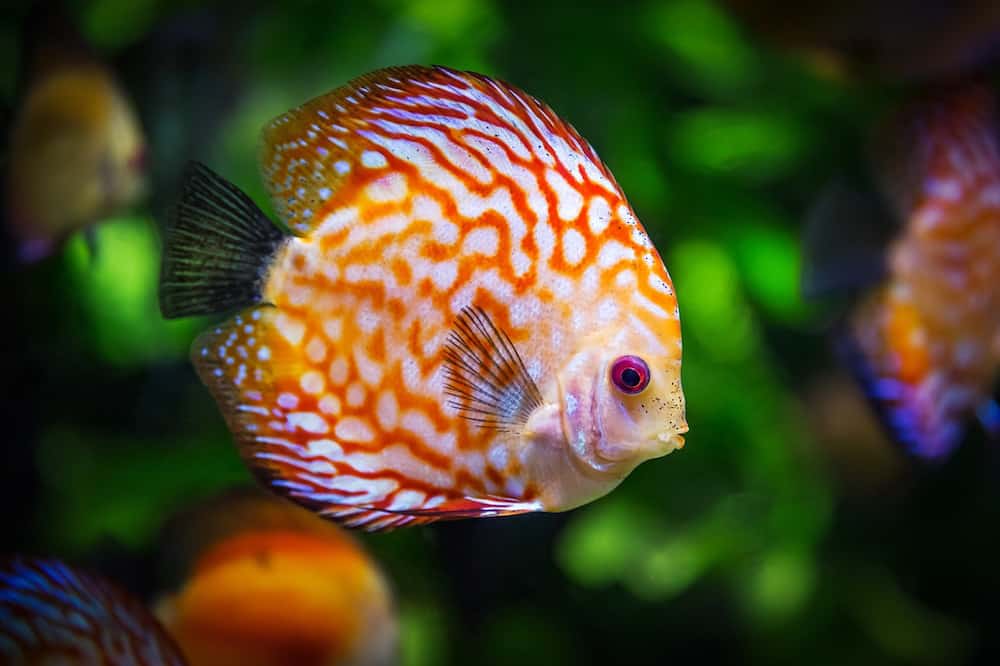
When a mammal sleeps, they generally lie down and close their eyes. But what about fish? Interestingly, the topic of fish sleep, including how and when they do it, is actively being researched. Researchers know that fish don’t sleep the way land mammals do. Instead, they appear to rest by reducing both activity and metabolism. Ashley Silver, graduate research assistant to marine biologist Tiara Moore and member of Black in Marine Science (BIMS), tells Sleepopolis that there are a few clues if you’re staring into a tank and wondering if your goldfish is sneaking a nap.
Long Story Short
- Fish don’t sleep the way humans do, but they do sleep in their own way.
- They exhibit brain activity that suggests sleep, but their sleep stages are different from humans.
- Sleep habits for fish vary depending on the species and environment.
- A fish is likely “sleeping” if it’s remaining motionless for a period of time, slow to respond to food or other stimuli, or appears to be laying on the bottom or another object.
Do Fish Sleep?
Research suggests that many types of fish appear to sleep, but it’s not the same as human sleep — fish don’t lie down, close their eyes, and nod off. To begin, fish don’t even have eyelids. Nor do they have a neocortex in the brain, which is the part that slows down activity during sleep. But if you watch fish in a tank, you can see that they do rest — this is as close to “sleep” as many fish species get, so know that when we’re talking about fish sleep habits, we may also be referring to their rest habits.
“Fish exhibit a variety of sleep, or perhaps more accurately, rest behaviors, influenced by their species, habitat, and biological needs,” Eric Hovland, biologist at The Florida Aquarium, tells Sleepopolis. Most seem to be more alert than humans when they’re resting (1), with an activity level that likewise varies depending on the species—more on that later.
Fish Sleep Stages
There isn’t much research into the sleep stages of fish. But according to one study on zebrafish, they may have two stages that are similar to those experienced by humans: slow-wave and rapid eye movement (REM) (2). In the study, researchers recorded brain activity and observed heart rate, eye movement and muscle tone of the sleeping fish. While the fish didn’t move their eyes during REM sleep (nor did they close them, as they lack eyelids), researchers say both brain and muscle signatures are similar to sleeping humans.
There were other similarities, too. The fish were still, had relaxed muscles and reduced cardio-respiratory rhythm, plus they didn’t react when approached.
Do Fish Have a Circadian Rhythm?
Our circadian rhythm is essentially our internal body clock, which regulates our sleep-wake cycle (3). Like humans, Silver says that fish have circadian rhythms that are influenced by exposure to light. Some species are active during the day and rest at night, while others, like black-tip reef sharks, are nocturnal, which means they sleep during the day and are active at night. “Deep-sea fish are not exposed to the light to exhibit those patterns,” says Silver. “Their activity is mostly influenced by food availability. They are active during feeding and resting when not feeding.”
One study of zebrafish found that fish could be woken from sleep either by light exposure or a mechanical or electrical stimulus; however, only the light exposure had an effect on the amount of rest the fish got for days afterward (4).
How Do Fish Sleep?
Sleep habits vary significantly among fish species, and some research suggests they’ve evolved based on environmental conditions (5). “The diversity in sleep behaviors among the thousands of species of fish reflects their adaptations to different ecological niches and survival strategies for nearly a half a billion years,” says Hovland. But there are common patterns that can indicate sleep or rest. That includes hovering in place, reduced activity, or burrowing.
“Some fish reduce their activity levels during rest periods rather than completely stopping,” notes Hovland. “For example, certain species of sharks must keep moving to breathe via a process called ‘ram ventilation’, but enter a state of reduced activity at times where they swim slowly and become less responsive.” Even while they are sleeping, many fish species manage to stay alert so they can escape if they’re in danger.
What Is Ram Ventilation?
Fish that need to swim to “breathe” rely on ram ventilation, which is where their forward movement pushes water into their gills and allows them to extract oxygen. That means any species that rely on ram ventilation will not “sleep” or rest without motion. Some common sea creatures that rely on ram ventilation include certain types of sharks, tunas, and mackerels.
When Do Fish Sleep?
Sleep timing for fish depends on their species and location, but many scientists believe that fish follow regular sleep schedules. “Diurnal fish are active during the day and rest at night much as most of us do that aren’t working the night shift, while nocturnal fish are active at night and rest during the day,” says Hovland.
For example, fish living near coral reefs are generally active during the day and can hide in the reef at night to stay safe from predators. Surface fish who have the most exposure to light from the sun usually stay active during the day and sleep during the nighttime, too. Their eyesight makes it easier to see food during the daytime, and they sleep at night because they can’t see well when it’s dark. Fish that live in aquariums often sleep when the lights go out, just like we do (so it’s a good idea to turn off the light in your tank).
Where Do Fish Sleep?
Where a fish chooses to sleep or rest depends on the kind of fish it is. “Many fish, such as catfish and some species of cichlids, rest on the bottom of their aquatic environment,” says Hovland. “They often find a secure spot where they can remain stationary and reduce their activity.” Reef fish, on the other hand, hover in place, often in a crevice or near a structure. “They remain relatively motionless, conserving energy while staying alert to potential threats,” he adds.
Still other species retreat to underwater caves or may even rest on other organisms, notes Silver, as is the case with many fish found on coral reefs. The level of protection a particular fish species needs can also influence sleep location. “Some fish can sleep in the open and others have to retreat to avoid predators,” explains Silver. Then there are the fish that rest in groups or burrow. According to Hovland, some species of wrasses bury themselves in sand or find another secure hiding place where they can rest safely.
Do All Fish Sleep the Same Way?
With so many fish species around the world, it makes sense that their sleep habits vary. Environmental conditions and species-specific behaviors dictate whether a fish sleeps out in the open or hides, whether it sleeps at night or during the day, and how much movement it needs while sleeping or resting.
Sharks and rays, for example, always need to move water over their gills to get enough oxygen—that’s ram ventilation, which we also mentioned when we explained how fish sleep. These species experience something called unihemispheric sleep, during which half of the brain goes to sleep while the other remains active. (6) This allows them to keep swimming at a slower pace.
Even within comparable species, sleeping habits can vary. “Some species, particularly those in environments with constant threats or those requiring continuous movement for respiration (like some pelagic sharks), may not have a true sleep state,” notes Hovland. “Instead, they exhibit periods of lower activity and reduced responsiveness.”
Other species have their own sleep habits as well. “Fish such as the colorful parrot fish secrete a mucous cocoon around themselves before resting on the coral reef for the evening,” says Hovland. “This may help protect them from predators and parasites by masking their appearance and smell.”
How to Tell if Fish Are Sleeping
There are a few ways to determine if a fish is sleeping or resting. “One way to tell if a fish is asleep or not is their response time to food exposure,” says Silver. “If you put food in a fish tank and the fish is not swimming towards the food within a few seconds. It’s most likely sleeping.” Fish who have retreated to an area in the tank or appear to be laying on the bottom or another object are likely sleeping. Most tellingly, fish who repeat the same behavior around the same time each day (generally when the aquarium light is turned off) are probably sleeping.
FAQs
Do fish sleep at night?
It depends on the fish species and their environment. Many fish have specific times during which they rest. Some fish are diurnal, meaning they’re active during the rest and rest at night, while nocturnal fish are active at night and rest during the day.
Do fish sleep with their eyes open?
Fish do indeed sleep with their eyes open because, unlike land-dwelling animals, they don’t have eyelids. That can make it difficult to determine whether they’re sleeping, so it’s important to look for other signs of a resting state, such as hovering or floating in place, reduced activity and a slow response time to stimulus.
The Last Word From Sleepopolis
The sleep habits of fish may be different than humans, but it’s clear that fish species do indeed sleep in their own way. Research is ongoing, but we know that fish are likely sleeping when they remain motionless for periods of time, appear to be laying on the bottom of the tank or hovering right beneath the water’s surface, or hiding in a cave or crevice. While you can’t look for closed eyes to indicate sleep, since fish don’t have eyelids, a slow reaction time in response to food is a big clue.
Sources
Silver, Ashley. Personal interview. July 2024.
Hovland, Eric. Personal interview. July 2024.
- A.C. Keene, L. Appelbaum, Handbook of Behavioral Neuroscience, Elsevier, Volume 30, 2019, Pages 363-374, https://doi.org/10.1016/B978-0-12-813743-7.00024-4.
- Leung LC, Wang GX, Madelaine R, Skariah G, Kawakami K, Deisseroth K, Urban AE, Mourrain P. Neural signatures of sleep in zebrafish. Nature. 2019 Jul;571(7764):198-204. doi: 10.1038/s41586-019-1336-7. Epub 2019 Jul 10. PMID: 31292557; PMCID: PMC7081717.
- Circadian Rhythms. (2023). National Institute of General Medical Sciences. Retrieved August 1, 2024 from https://www.nigms.nih.gov/education/fact-sheets/Pages/circadian-rhythms.aspx
- Altenhofen S, Bonan CD. Zebrafish as a Tool in the Study of Sleep and Memory-related Disorders. Curr Neuropharmacol. 2022 Mar 4;20(3):540-549. doi: 10.2174/1570159X19666210712141041. PMID: 34254919; PMCID: PMC9608234.
- Duboué ER, Keene AC, Borowsky RL. Evolutionary convergence on sleep loss in cavefish populations. Curr Biol. 2011 Apr 26;21(8):671-6. doi: 10.1016/j.cub.2011.03.020. Epub 2011 Apr 7. PMID: 21474315.
- Michael L. Kelly, Shaun P. Collin, Jan M. Hemmi, John A. Lesku; Evidence for Sleep in Sharks and Rays: Behavioural, Physiological, and Evolutionary Considerations. Brain Behav Evol 10 January 2020; 94 (1-4): 37–50. https://doi.org/10.1159/000504123



























